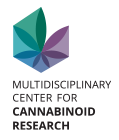Until very recently the cannabis plant and its extracts (popularly called marijuana, hashish, weed, grass, etc.) were mostly frowned upon recreational drugs. In fact, in many places, they are still illegal. But the ‘modern’ scientific era of cannabis research over the last 5 decades, spearheaded by Professor Raphael Mechoulam at the Hebrew University of Jerusalem, heralded in a new age with a promising new vision for humankind.
The isolation of the psychoactive ingredient of Cannabis Sativa (Δ9-THC), identification of its chemical structure and the discovery of its endogenous counterparts - collectively termed endocannabinoids - plus the isolation and identification of various phytocannabinoids, have ushered in a wealth of pre-clinical and clinical studies, shedding light on the efficacy of the endocannabinoid system to deal with human health and disease. Endocannabinoids control an array of biological and pathological processes, recognized as key mediators of numerous aspects of human pathophysiology – among the most widespread and versatile signaling molecules ever discovered.
The Hebrew University School of Pharmacy's Multidisciplinary Center for Cannabinoid Research is integrating, coordinating and conducting this exciting research on cannabinoids, endocannabinoids and medical Cannabis, focusing on the following areas: CANCER; PAIN, INFLAMATION & STRESS MANAGEMENT; IMMUNITY; METABOLISM; DRUG DELIVERY & NANOTECHNOLOGY; PHARMACEUTICAL CHEMISTRY; NEUROSCIENCE and PLANT SCIENCE & GENETICS. One of its major objectives is to foster collaborations between its own participating laboratories and many other well-established groups around the globe who are conducting research on cannabinoids, endocannabinoids and medical Cannabis.
To see the center's brochure – click here
Background
Cannabis Sativa is perhaps the plant with the longest history of cultivation by man. Most certainly used by mankind throughout thousands of years of history as the most common “recreational drug” for pleasure and the alleviation of stress. Despite its nearly universal illegality (until the 21st century) the plant and its extracts – in street lingo: hashish, marijuana, weed or grass – at least had the redeeming feature of being non-addictive. But its true worth lay hidden until the end of the 20th century when serious scientific Cannabis research began.
A mere 50 years ago, Professor Raphael Mechoulam of the Hebrew University isolated the psychoactive ingredient of Cannabis Sativa, Δ9-tetrahydrocannabinol (Δ9-THC,) and identified its chemical structure. He later discovered the endogenous counterparts of THC - collectively termed endocannabinoids – including anandamide in 1992 and 2-arachidonoylglycerol (2-AG) in 1995. These new inroads by the Mechoulam group, combined with the further isolation and identification of various phytocannabinoids, such as cannabigerol, cannabigerolic acid and cannabichromene, have generated a wealth of basic, translational and clinical studies.
Substantial ongoing research has brought to light the quite amazing impact of the endocannabinoid system on human health and disease, identifying an array of proteins that bind, synthesize, and degrade them. Endocannabinoids control a huge number of biological and pathological processes and have been recognized as key mediators of several aspects of human pathophysiology, and thus have emerged to be among the most widespread and versatile signaling molecules ever discovered.
Rationale
The establishment of the Multidisciplinary Center for Cannabinoid Research (MCCR) at the School of Pharmacy of the Hebrew University in Israel has great relevance at this specific time in modern history – a time when both international academic institutions and mega-pharmaceutical companies all around the globe are channeling enormous efforts towards, and investing heavily in basic and clinical research in this exciting new field.
The MCCR fills the need for a central, professional body who undertakes to integrate and coordinate all these worldwide research activities into one cohesive whole – assisting collaborations and disseminating collective information.
The MCCR is staffed by eminent scientists and Medical Doctors from a variety of faculties at the Hebrew University and Hadassah-University Medical Center. The faculties involved span the entire spectrum relevant to this research – from Medicine, Medicinal Chemistry, Biotechnology, Biopolymers & Pharmaceutical Chemistry to Plant Science & Genetics in Agriculture. The Center’s teams of highly qualified researchers comprise Heads of Labs and Research Groups comprehensively ranging through Nano-Medicine & Nano Delivery Systems, Tumour Micro-environment, Neurobiology, Pain Relief & Plasticity, Molecular Modeling & Drug Design, Immuno-pharmacology, Free Radicals, Stress and Plant Pathogen Interactions.
